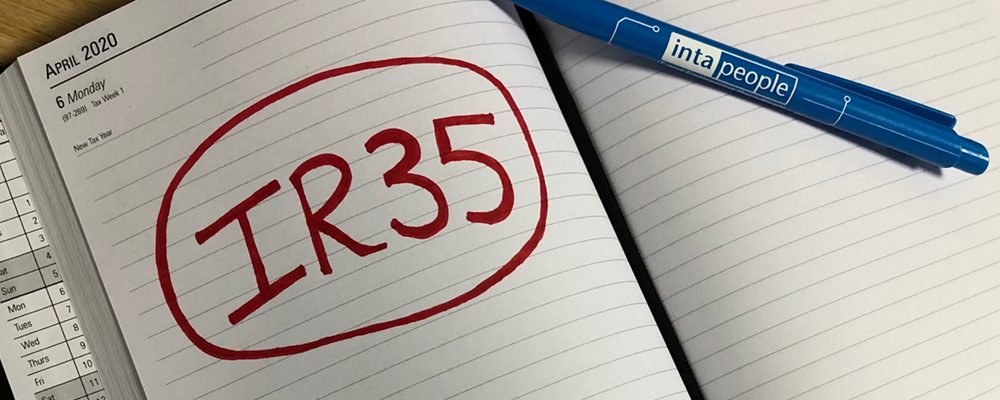IR35 changes; guidance and advice for employers
Author: IntaPeople | Date published: 31/10/19


IR35 changes are coming…. Here’s a brief snapshot of what your business needs to know
If you work in a business that engages freelance/self-employed contractors, it’s likely you will have heard the term ‘IR35’ and you may be aware that further changes are planned to come into effect on 6 April 2020.
What is IR35?
IR35 is a common term that refers to Inland Revenue Notice 35, which sets out the Intermediary taxation rules and apply where an individual works through an intermediary such as their ‘own’ limited company or personal service company ‘PSC’, and provides their services to an end user client.
The legislation was first introduced in 2000 and is designed to reduce tax avoidance by freelance contractors who HMRC believe to be in ‘disguised employment’, (deemed to be individuals who work in a similar way to PAYE employees but charge for their services via their limited companies/PSC to make their business more tax efficient.
In 2017, the rules changed significantly for those working in the public sector, with the onus to prove self-employed status shifting from the contractor themselves to the end hirer. Similar changes are set to come into effect in the private sector in April 2020.
Determining employment status in relation to IR35
Currently within the private sector the freelance contractor has to prove certain criteria to show that there is no employment relationship between them and the business that they are supplying their services to, in order to determine whether they are ‘inside’ or ‘outside’ IR35.
The Inland Revenue has developed an online tool ‘CEST’ to assess employment status, which considers a number of factors within the service contract, some of which are;
Direction, Supervision and Control
Self-employed contractors must have control over how they go about their work for a contract to be deemed ‘outside’ IR35. If the agreement to provide services sets out strict working patterns and the client provides substantial input over how the work is completed, then it’s likely that this will be deemed as employment rather than freelance contract work.If the contract is deemed ‘inside’ IR35 and HMRC declares that it’s an employment relationship, then income tax and National Insurance should be deducted from the contractors’ earnings. If the contract is deemed as ‘outside’ of IR35 rules, then the PSC may continue to invoice as a limited company business and can pay the worker as a shareholder and employee through the PSC.
Right of Substitution
If the contractual agreement states that the end-client wants a specific individual, and only that specific individual, to provide their services from start to finish of the assignment, then it’s likely that this working relationship would fall ‘inside’ the IR35 legislation. Under this point, for an assignment to be deemed as ‘outside’ IR35 there should be a substitution clause in place in the contractual agreement, which allows for a substitute worker to complete the contract work on behalf of the PSC.
Mutuality of obligation
Working as a self-employed contractor means an individual can work on a project-by-project basis without any obligation to continue working for that client once the assignment or project that they are working on comes to an end. Similarly, clients are under no obligation to continue offering the contractor further work once the project that the contractor was first engaged on is complete.
IR35 in the public sector
In 2017, the IR35 rules changed significantly for the public sector, with the onus to prove self-employed status shifting from the contractor themselves to the end client (i.e. the hirer or public sector body). These changes made hiring freelance contractors a greater financial risk to the hirer, as they (the hirer) can be hit with a financial penalty if they incorrectly initially deem a contractor to be ‘outside’ IR35, but the contractor is then later deemed to be ‘inside’ IR35. As a result, many public bodies made a business-wide decision not to use any contractors that worked via their own PSC.
IR35 and the private sector
The UK Government is currently in consultation about further IR35 changes. It’s envisaged that the IR35 reforms already implemented within the public sector are likely to be applied to the private sector in April 2020. This means that, with the exception of ‘small companies exemption’ (where the end user/hiring business is a small company as defined in the Companies Act 2006), private sector businesses that hire freelance contractors will be responsible for determining whether the contractor is ‘inside’ or ‘outside’ IR35.
At the time of writing there is now only circa 5 months before 6th April 2020. IR35 changes, with extension of the off-payroll rules into the private sector is coming. Businesses should be preparing for this change as soon as possible.
If you currently use the services of technology contractors or are considering this as an option to meet the needs of your projects, please get in touch. We have 25 years’ experience in the industry and are working closely with businesses and hiring managers like you to prepare for the changes IR35 will bring.
DISCLAIMER
‘IR35’ is a significant and complicated piece of UK legislation. The information provided in this article is general in nature, are the opinion of the author only, and must not be treated as a substitute for specific legal advice. You should not rely on its’ contents and you are advised to seek independent expert legal advice in relation to same. IntaPeople cannot be held responsible for any loss suffered as a result of any person or business relying on any comments made in this article.
